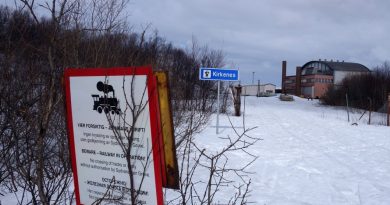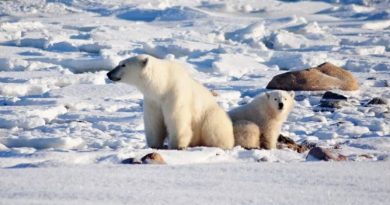VIDEO: Do mobility devices in the Arctic need a rethink?
CAMBRIDGE BAY, Canada _ Recovering from knee surgery isn’t easy for anyone, but for Jimmy Okhina Sr., living in Arctic Canada made it that much more of a challenge.
The surgery took place in Yellowknife, the capital city of Canada’s Northwest Territories.
Afterwards, Okhina was given a walker to take back to his home community of Cambridge Bay in Canada’s High Arctic.
He quickly realized it wasn’t going to do him much good.
“It’s OK for inside, but outside? No good in the snow,” he says. “Too hard to push.”
The lack of mobility affected Okhina’s ability to do everything from shopping to going out on the land with his family.
It was a hard adjustment for this retried heavy equipment operator used to an active life including everything from hunting to making komatiks, the sleds used by Inuit for travelling across the snow and ice.
Problem across North?
It’s hard to gauge to what extent the challenges faced by Okhina are shared by others in Canada’s northern territories. Or whether regional health authorities, or disability groups, have strategies in place to help people with the specific challenges of using things like wheelchairs and walkers in the Arctic.
The Northwest Territories Disability Council didn’t have anyone available for comment in time for deadline when reached by phone and email earlier this week.
The Nunavik Regional Board of Health and Social Services in northern Quebec didn’t respond to email and phone inquires this week about the issue.
The Coalition of Persons with Disabilities in Newfoundland and Labrador didn’t respond to email and phone inquiries this week about the challenges of using mobility devices in places like Nunatsiavut, the Inuit self-governing region in the province.
‘A lot of work to do’
But in Canada’s eastern Arctic territory of Nunavut, advocates for those with mobility challenges say the lack of ‘northern-adapted’ devices is one of a suite of issues that can make even just getting out of your house a challenge.
“It’s a problem,” says Alex Rowlson, a project manager at the Iqaluit-based Nunavummi Disabilities Makinnasuaqtiit Society, an organization that promotes the rights of people with disabilities in the territory of Nunavut.
“It goes from devices to building accessibility. For example, most buildings have wheelchair ramps but no buttons to open the doors when you get to the top. And I don’t know why that is.
“So you can see, there’s a lot of work to do.”
An Arctic solution
As for Jimmy Okhina, he decided to ditch the walker and find his own solution, making an ‘Arctic-adapted’ walker himself, based on the construction of the Inuit sleds he’s spent his life building.
“It’s my idea,” he says, flipping the walker upside down to show off the features that have helped him recover his pre-surgery independence.
Treads on the bottom let him do everything from going to the store in heavy snowfall to going out on the land hunting with his family.
(He just puts his little ‘walker-komatik’ in a regular-sized hunting komatik, he says.)
More importantly, when he built his Arctic-adapted walker, he made sure it had a storage space in it so he could continue to transport his tools easily when he’s outside making komatiks for people in the community.
(Yes, at 76 he still takes orders and is outside everyday, no matter the weather, to build them.)
“It works (for) me,” Okhina says demonstrating his walker-sled in the komatik construction area outside his home.
“It works all the time. No problem.”
Write to Eilís Quinn at eilis.quinn(at)cbc.ca
Related stories from around the North:
Finland: Falls on the ice cost Helsinki, Finland a million in damages, Yle News



